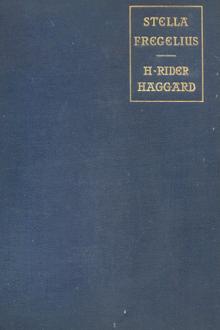The Story of the Volsungs (Volsunga Saga); with Excerpts from the Poetic Edda, - [e book reading free .txt] 📗

- Author: -
Book online «The Story of the Volsungs (Volsunga Saga); with Excerpts from the Poetic Edda, - [e book reading free .txt] 📗». Author -
"So Loki beheld the gold of Andvari, and when he had given up the gold, he had but one ring left, and that also Loki took from him; then the dwarf went into a hollow of the rocks, and cried out, that that gold-ring, yea and all the gold withal, should be the bane of every man who should own it thereafter.
"Now the gods rode with the treasure to Hreidmar, and fulfilled the otter-skin, and set it on its feet, and they must cover it over utterly with gold: but when this was done then Hreidmar came forth, and beheld yet one of the muzzle hairs, and bade them cover that withal; then Odin drew the ring, Andvari's loom, from his hand, and covered up the hair therewith; then sang Loki—
"'Gold enow, gold enow, A great weregild, thou hast, That my head in good hap I may hold; But thou and thy son Are naught fated to thrive, The bane shall it be of you both.'"Thereafter," says Regin, "Fafnir slew his father and murdered him, nor got I aught of the treasure, and so evil he grew, that he fell to lying abroad, and begrudged any share in the wealth to any man, and so became the worst of all worms, and ever now lies brooding upon that treasure: but for me, I went to the king and became his master-smith; and thus is the tale told of how I lost the heritage of my father, and the weregild for my brother."
So spake Regin; but since that time gold is called Ottergild, and for no other cause than this.
But Sigurd answered, "Much hast thou lost, and exceeding evil have thy kinsmen been! But now, make a sword by thy craft, such a sword as that none can be made like unto it; so that I may do great deeds therewith, if my heart avail thereto, and thou wouldst have me slay this mighty dragon."
Regin says, "Trust me well herein; and with that same sword shalt thou slay Fafnir."
ENDNOTES: (1) Waterfall (Ice. "foss", "fors"). (2) Ran is the goddess of the sea, wife of Aegir. The otter was held sacred by Norsefolk and figures in the myth and legend of most races besides; to this day its killing is held a great crime by the Parsees (Haug. "Religion of the Parsees", page 212). Compare penalty above with that for killing the Welsh king's cat ("Ancient Laws and Institutes of Wales". Ed., Aneurin Owen. Longman, London, 1841, 2 vols. 8vo).CHAPTER XV. Of the Welding together of the Shards of the Sword Gram. So Regin makes a sword, and gives it into Sigurd's hands. He took the sword, and said—
"Behold thy smithying, Regin!" and therewith smote it into the anvil, and the sword brake; so he cast down the brand, and bade him forge a better.
Then Regin forged another sword, and brought it to Sigurd, who looked thereon.
Then said Regin, "Belike thou art well content therewith, hard master though thou be in smithying."
So Sigurd proved the sword, and brake it even as the first; then he said to Regin—
"Ah, art thou, mayhappen, a traitor and a liar like to those former kin of thine?"
Therewith he went to his mother, and she welcomed him in seemly wise, and they talked and drank together.
Then spake Sigurd, "Have I heard aright, that King Sigmund gave thee the good sword Gram in two pieces?"
"True enough," she said.
So Sigurd said, "Deliver them into my hands, for I would have them."
She said he looked like to win great fame, and gave him the sword. Therewith went Sigurd to Regin, and bade him make a good sword thereof as he best might; Regin grew wroth thereat, but went into the smithy with the pieces of the sword, thinking well meanwhile that Sigurd pushed his head far enow into the matter of smithying. So he made a sword, and as he bore it forth from the forge, it seemed to the smiths as though fire burned along the edges thereof. Now he bade Sigurd take the sword, and said he knew not how to make a sword if this one failed. Then Sigurd smote it into the anvil, and cleft it down to the stock thereof, and neither burst the sword nor brake it. Then he praised the sword much, and thereafter went to the river with a lock of wool, and threw it up against the stream, and it fell asunder when it met the sword. Then was Sigurd glad, and went home.
But Regin said, "Now whereas I have made the sword for thee, belike thou wilt hold to thy troth given, and wilt go meet Fafnir?"
"Surely will I hold thereto," said Sigurd, "yet first must I avenge my father."
Now Sigurd the older he grew, the more he grew in the love of all men, so that every child loved him well.
CHAPTER XVI. The prophecy of Grifir.
There was a man hight Grifir,(1) who was Sigurd's mother's brother, and a little after the forging of the sword Sigurd went to Grifir, because he was a man who knew things to come, and what was fated to men: of him Sigurd asked diligently how his life should go; but Grifir was long or he spake, yet at the last, by reason of Sigurd's exceeding great prayers, he told him all his life and the fate thereof, even as afterwards came to pass. So when Grifir had told him all even as he would, he went back home; and a little after he and Regin met.
Then said Regin, "Go thou and slay Fafnir, even as thou hast given thy word."
Sigurd said, "That work shall be wrought; but another is first to be done, the avenging of Sigmund the king and the other of my kinsmen who fell in that their last fight."
ENDNOTES: (1) Called "Gripir" in the Edda.CHAPTER XVII. Of Sigurd's Avenging of Sigmund his Father. Now Sigurd went to the kings, and spake thus—
"Here have I abode a space with you, and I owe you thanks and reward, for great love and many gifts and all due honour; but now will I away from the land and go meet the sons of Hunding, and do them to wit that the Volsungs are not all dead; and your might would





Comments (0)